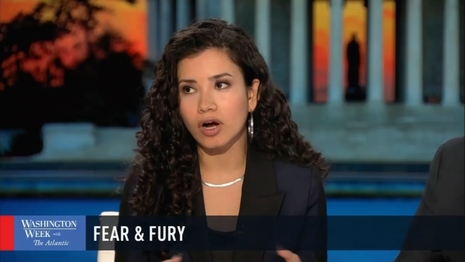 No one should think PBS is an oasis of civility. On Friday’s Washington Week with The Atlantic, the liberal gang typically rained fire on conservatives in general and the late Charlie Kirk in particular. No one had a critical word for rhetorical extremism on the left, and there was really no focus on the killer.
No one should think PBS is an oasis of civility. On Friday’s Washington Week with The Atlantic, the liberal gang typically rained fire on conservatives in general and the late Charlie Kirk in particular. No one had a critical word for rhetorical extremism on the left, and there was really no focus on the killer.
Moderator Jeffrey Goldberg briefly mentioned the alleged shooter in custody, Tyler Robinson, but claimed “We will try to be responsible here about not overspeculating” about his motives. That was not worth discussing.
Peter Baker of The New York Times said Kirk “riled up” people and is a symbol of our “toxic culture.”
Now, he said a lot of things that got a lot of people riled up, right? And that was part of his style about race, about gender, about affirmative action and Islam and things like that. But he also enjoyed going to college campuses like the one he was at. Even though he knew an audience there might include people who didn’t agree with him, and he liked to mix it up. And he’s, you know, become in this last few days, I think, a symbol of the toxic culture that we’re in right now, in politics.
Not only did Peter Baker talk about Charlie Kirk being a “symbol of the toxic culture,” Laura Barron-Lopez said Kirk was “known to make racist statements” and “lobbed a number of attacks on transgender individuals.” THIS…IS PBS. They hate and smear conservatives. They have a… pic.twitter.com/cnPEG5PAp9
— Tim Graham (@TimJGraham) September 14, 2025
Laura Barron-Lopez, who just switched teams from PBS to MSNBC (they’re awfully similar), trashed and distorted Kirk’s views:
The reason that he is seen as a divisive figure, and why the left has had a reaction as well in this is because he has been known to make racist statements, to say that, you know, if he were to see a black pilot, he wouldn’t necessarily trust their ability to fly a plane. He has also said that it was a mistake to pass the Civil Rights Act, and has definitely lobbed a number of attacks on transgender individuals. And so there’s a lot across the LGBTQ advocacy space who are opposed to him.
Barron-Lopez mangled what Kirk actually said about “affirmative action” and black pilots, that picking pilots based on racial quotas causes. He said “If I see a Black pilot, I’m going to be like, ‘Boy, I hope he’s qualified.'” But he also said: “That’s not who I am. That’s not what I believe…I’m connecting two dots. Wait a second, this CEO just said that he’s forcing that a white qualified guy is not gonna get the job. So I see this guy, he might be a nice person and I say, “Boy, I hope he’s not a Harvard-style affirmative-action student that … landed half of his flight-simulator trials…It also… creates unhealthy thinking patterns. I don’t wanna think that way. And no one should, right?”
Tom Nichols praised Kirk, only to trash the memory of Rush Limbaugh:
Charlie Kirk, I think, kind of patented almost was the ability to do this and seem likable, friendly, open. You know, the people that met him, even people that didn’t agree with him said he, you know, he was always polite and so on. You know, he modeled himself early on after Rush Limbaugh, but without Limbaugh’s hard edges. I mean, Limbaugh was, you know, caustic constantly.
When Goldberg brought up Utah Gov. Spencer Cox’s remarks about turning down the toxicity, Glasser said he’s for “de-polluting our public space,” and “a lot of people are going to agree with that message, but it’s not the Republican Party’s message.” Spoken like a partisan Democrat.
For our colleagues at Free Speech America, Goldberg lamented how social media should be much more aggressively regulated (censored):
GOLDBERG: We’re talking about social media as if it’s the weather, which is not — which is we all complain about, but we can’t do anything about. But the social media algorithms are controlled by a small number of people who live in the United States, and who makes sure that anger is the product that they’re pushing out. And so we’re talking — you know, it’s just interesting to me, there’s a kind of learned helplessness almost.
GLASSER: Yes. No, Jeff, I think it’s a really important point. But remember, it’s not just in isolation from our politics or from any other aspect in our life. So, it’s not as simple as some sort of a technology problem where we can flip a switch. Because who’s running the country right now, people who have succeeded in a political environment in which hatred and division is a much more successful way to go.
Finally, you have to roll your eyes when this crew started talking about how it’s all wrong to call the Left “evil.” This exchange underlines how desperately this show could use a dissenting conservative viewpoint:
GOLDBERG: So, there’s no doubt that many people on the left have called Charlie Kirk and other people in on the right terrible names, exaggerations. There’s also a level of obliviousness to what Donald Trump said. Because people in his own movement, including and especially him, have also used what we would think of in older periods of American politics as outrageous language to talk about adversaries on the left that —
BAKER: He used the word evil even more this time than he did in his first term. I did a search of this in his public speech. He calls Joe Biden evil. He refers to his enemies as communists, as traitors, as treasonous. These are words that are, of course, you know, inflammatory, just as the rhetoric on the left can be inflammatory about conservatives. But in Trump’s mind, it’s all on one side.
GOLDBERG: Right.
BAKER: He wants everybody to think this is just about the left wing, have no conversation about his own rhetoric or the rhetoric of the people who support him.
NICHOLS: Right into the memory hole, the president’s statement, as he gave that statement, as if he has never called his opponents vermin, human scum, really, you know, violent imagery and language, even right after this thing, you know, we have to find these people and, you know, do them harm basically. And it is remarkable the degree to which the president kind of just waves a hand and says all of those things, that’s just political rhetoric. What the left does is extremely dangerous and evil and so on. And —
BAKER: And if you press stop him from saying it or his people, then you are canceling it, right? That’s censorship. But the other side, obviously —
GLASSER: And that’s where I think we have to wonder whether this marks not just rhetoric from Donald Trump, and those were some striking words he used the other night, but I was really struck by his vow to go after organizations and groups that were supporting this.
First of all, he talked about this being the radical left. That’s the term he uses for the Democratic Party, which, in essence, is saying that the Democratic —
GOLDBERG: So, this before we know anything about the suspect.
GLASSER: Right. So, he’s blaming, in effect, the Democratic Party for this killing without even having a suspect. But more importantly, it strikes me that Trump and a number of very influential MAGA figures have been out there calling for activities to investigate and defund the left, to go after their organizations, to use the government against basically the political opposition in a much more concerted, full-throated way.
And are they going to take the moment of this tragedy and turn that into a government campaign against the political opposition? That’s the implication of what Trump was saying. We don’t know if he’ll follow through.
GOLDBERG: It seems like what we’re seeing is the beginning of two streams of thought, a Spencer Cox kind of idea, which everybody needs to calm down, and Donald Trump saying, the problem is on the left. And, obviously, the weight in the Republican Party right now is more on the Trump side.















